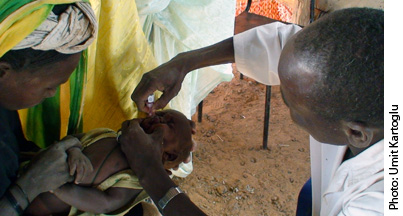Advocating for Change: Rotavirus Vaccines
|

As doctors and researchers, we have spent our lives treating sick children and consoling families rocked by illnesses and deaths that could have been prevented. Too many times, we have lost patients to preventable causes like diarrhea.
But when it comes to rotavirus, the most common cause of severe childhood diarrhea, we're turning the page - helping to protect children by encouraging every nation to introduce rotavirus vaccines. They are safe, effective tools preventing illnesses and deaths with dozens of studies demonstrating their impact. In fact, our colleagues have found that rotavirus vaccine use has led to significant reductionsin hospitalizations and deaths not just due to rotavirus, but all causes of diarrhea in many of the countries that have introduced rotavirus vaccination.
Evidence like this is critical to global efforts to ensure rotavirus vaccines are reaching all of the children who need them. For this reason, the Rotavirus Organization of Technical Allies (ROTA) Council,which we co-chair, is working to provide policymakers with the evidence needed to inform decisions related to vaccine introduction. We are calling on policymakers to expand the use of rotavirus vaccines and make diarrhea illnesses and deaths a thing of the past. And we are working with partners, like PATH,to spread the word that rotavirus vaccines are an important part of a comprehensive approach—one that includes interventions like oral rehydration therapy and zinc supplementation— to combatting diarrheal disease.
As recent rotavirus vaccine introductions in the Philippines and Yemen demonstrate, leaders in more and more countries around the world are prioritizing rotavirus prevention. As of August 2012, 41 countrieshave introduced rotavirus vaccines. Tremendous progress is being made, but there is still work to be done.
Time and time again, we have seen the quick, and often deadly, turn that rotavirus can take in countries where children are not protected through vaccination. Ninety-five percent of rotavirus deaths take place in countries eligible for vaccine introduction support from the GAVI Alliance. But today, many of the developing countries that stand to benefit most have not yet introduced these vaccines. As our colleagues reported recently in the journal Vaccine, “documenting the anticipated health benefits of vaccination in these settings will be key to sustaining and encouraging broader use of rotavirus vaccines.”
We call upon governments to prioritize the introduction of rotavirus vaccines and invest in national health systems. The saying goes that a nation is only as strong as its health system—and health systems require innovation and investment to thrive. Systems with appropriate funding, staff, communication, supplies and equipment are best positioned to deliver the protection of vaccines to children, fight poverty and foster development.
The scientific community is doing its part—providing the evidence needed for decision making—and it must continue these efforts. Now, it's time for broader global health community to help ensure decision makers are being reached. More voices are needed so that more countries heed the call for the introduction of rotavirus vaccines. Working together, with a chorus of voices, we can ensure decision makers understand the burden of rotavirus and promise of vaccines.
Will you join us?
-- Dr. Ciro A. de Quadros, Executive Vice President of the Sabin Vaccine Institute, and Dr. Mathuram Santosham, Professor of International Health and Pediatrics at the Johns Hopkins Bloomberg School of Public Health, are Co-chairs of the Rotavirus Organization of Technical Allies (ROTA) Council, a dedicated team of technical experts focused on saving lives and improving health by promoting the use of rotavirus vaccines as part of a comprehensive approach to addressing diarrheal disease.














